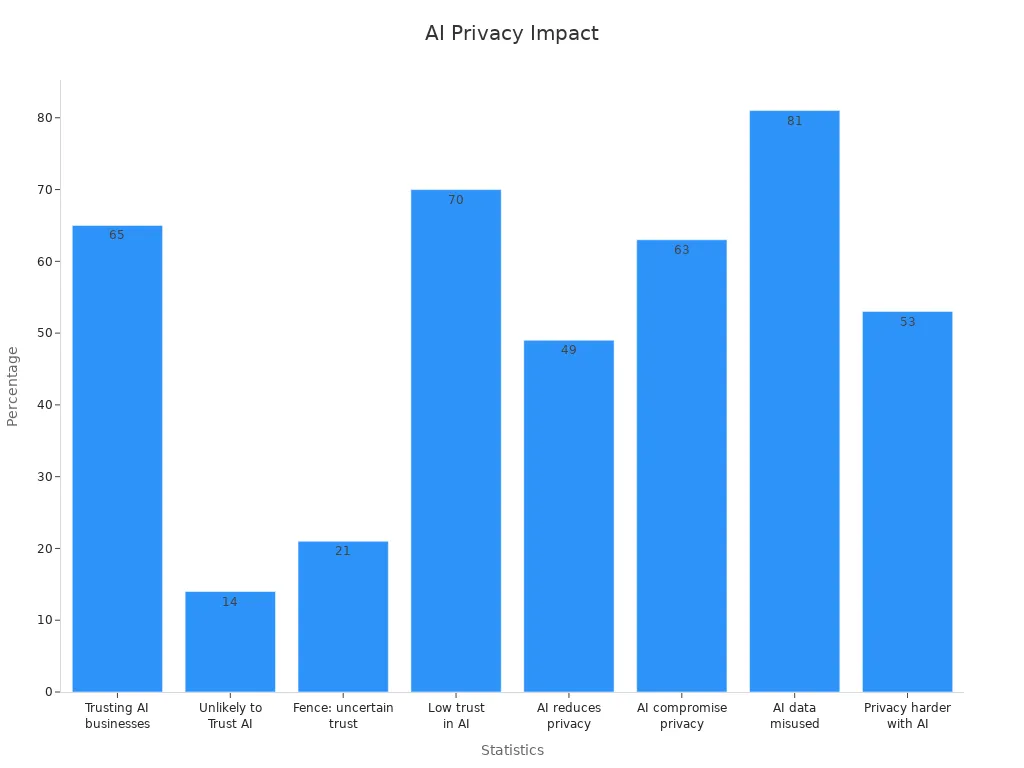
Artificial intelligence is revolutionizing how you connect with your audience on AI social media. By 2025, platforms powered by AI social media will enable you to deliver hyper-personalized experiences that drive results. Retailers relying on personalization are expected to see up to 40% more revenue, while 80% of consumers prefer companies offering tailored interactions. AI social media doesn’t just enhance engagement—it streamlines processes too. Studies show that 79.05% of marketers rely on AI social media to boost productivity, with 43.46% reporting significant cost savings through automation. As competition intensifies, adopting AI-driven marketing strategies will be your key to staying ahead.
Key Takeaways
-
Use super-customized ideas to connect with your audience. Make experiences fit what people like to keep them interested and sell more.
-
Try predictive tools to improve your marketing plans. Guess trends and change plans quickly to get better results.
-
Use automation to make marketing easier. Save time by letting machines do boring tasks but still keep it real.
-
Mix AI with cool tech like AR and VR. Make fun and exciting experiences that wow your customers.
-
Always use AI in a fair and honest way. Be clear and fair to earn trust and keep loyal customers.
AI Social Media and the Future of Marketing
Hyper-Personalization for Targeting Audiences
AI social media platforms are redefining how you connect with your audience through hyper-personalization. By leveraging artificial intelligence, you can analyze vast amounts of data to deliver tailored experiences that resonate with individual preferences. Streaming giants like Netflix and Spotify exemplify this trend. They use viewing and listening histories to recommend content, boosting user retention and satisfaction.
Tip: Hyper-personalization isn’t just about content recommendations. AI and machine learning optimize ad placements, automate customer segmentation, and refine bidding strategies, increasing conversion rates by up to 30%.
|
Evidence Type |
Description |
|---|---|
|
Tailored Content |
Increases relevancy, driving higher engagement rates. |
|
Real-World Example |
Streaming platforms like Netflix use viewing history to suggest content. |
|
AI Integration |
Optimizes bidding strategies and automates segmentation for better results. |
Hyper-personalization empowers you to target audiences with precision, ensuring your marketing efforts align with their needs and preferences. This approach fosters deeper connections and drives growth in customer engagement.
Predictive Analytics for Smarter Campaigns
Predictive analytics is transforming the future of marketing by enabling smarter, data-driven campaigns. AI technology allows you to anticipate trends, forecast outcomes, and adapt strategies in real time. For example, hybrid predictive models reduce forecast errors by 37%, while real-time analytics improve conversion rates by 23% and customer retention by 18%.
|
Metric/Model |
Improvement/Outcome |
|---|---|
|
Hybrid Predictive Models |
37% reduction in forecast error compared to traditional methods. |
|
Real-Time Analytics |
23% higher conversion rates and 18% greater customer retention. |
|
AI-Optimized Budget Allocation |
15-30% improvement in marketing ROI. |
Note: Sentiment-driven models enhance emotional relevance in campaigns, helping you connect with your audience on a deeper level.
AI-powered insights enable you to monitor campaigns live, adjust strategies instantly, and allocate budgets effectively. These capabilities ensure your marketing efforts remain agile and impactful, driving measurable results.
Automation for Streamlined Marketing Processes
Automation is revolutionizing social media marketing by simplifying complex processes and saving valuable time. AI marketing trends show that automation tools can save up to six hours per week, increase sales productivity by 12%, and reduce marketing overhead by 12.2%.
|
Statistic |
Value |
|---|---|
|
Time saved per week using automation tools |
Up to 6 hours |
|
Increase in sales productivity due to marketing automation |
12% increase |
|
Percentage of companies seeing ROI from automation within 6 months |
44% |
|
ROI generated from marketing automation over 3 years |
$5.44 for every $1 spent |
|
Reduction in marketing overhead due to automation |
12.2% reduction |
|
Increase in sales opportunities for B2B marketers using automation |
20% increase |
Automation tools powered by AI streamline repetitive tasks like scheduling posts, analyzing performance metrics, and managing customer engagement. McDonald’s uses AI to deliver mass personalization, enhancing customer loyalty and user experience. General Motors employs social listening to refine its digital marketing strategies, improving audience connections and brand image.
Alert: While automation boosts efficiency, maintaining authenticity in your interactions remains crucial.
AI-driven automation not only saves time but also ensures your marketing strategies are scalable and effective, allowing you to focus on creative growth initiatives.
Why AI is Transforming Audience Engagement
Meeting Evolving Consumer Expectations
Artificial intelligence is reshaping how you meet the ever-changing expectations of your audience. Consumers demand personalized experiences, instant responses, and content that resonates emotionally. AI enables you to deliver on these demands by analyzing vast amounts of data to understand preferences, behaviors, and emotional triggers.
-
By 2025, over 80% of executives in retail and consumer industries plan to utilize AI to enhance business operations.
-
AI-powered campaigns result in a 131% increase in click-through rates and a 41% boost in overall engagement compared to traditional methods.
-
AI optimization leads to 184% higher email open rates and an 83% increase in social media engagement.
Tip: Use AI-driven audience segmentation to tailor your strategies for specific demographics, ensuring your content aligns with their needs.
AI marketing trends show that integrating popular events, themes, and emotions into your content can significantly enhance customer engagement. This approach fosters deeper connections and drives growth in brand loyalty.
Decoding Complex Social Media Algorithms
Social media algorithms are constantly evolving, making it challenging to maintain visibility and relevance. AI simplifies this process by decoding these algorithms and adapting your strategies accordingly. Platforms like Facebook and Twitter use artificial intelligence to personalize content delivery, flag misinformation, and ensure user safety.
-
AI algorithms segment users based on their interactions and preferences, enabling hyper-personalization.
-
Real-time analytics allow platforms to track user behavior instantly, providing actionable insights for marketers.
-
Content moderation tools powered by AI identify harmful content, ensuring a safer online environment.
Alert: Leverage AI insights to optimize your content for algorithmic preferences, ensuring maximum reach and engagement.
AI marketing trends highlight the importance of understanding how algorithms prioritize content. By using AI, you can refine your strategies to align with these priorities, ensuring your audience sees your message at the right time.
Integrating AI with Emerging Technologies
The integration of AI with emerging technologies is revolutionizing audience engagement. Combining artificial intelligence with tools like augmented reality (AR), virtual reality (VR), and voice recognition creates immersive experiences that captivate your customers.
-
AI enhances social media engagement by incorporating cognitive understanding and emotional resonance into content.
-
AR and VR powered by AI allow you to create interactive campaigns that boost customer engagement.
-
Voice recognition tools enable seamless interactions, making it easier for customers to connect with your brand.
Note: Stay ahead of trends by exploring how AI can complement emerging technologies to deliver innovative marketing solutions.
AI-driven audience segmentation and analytics provide the foundation for integrating these technologies effectively. By leveraging AI, you can create experiences that not only meet but exceed consumer expectations, driving long-term growth and loyalty.
Real-World Applications of AI in Social Media

AI-Powered Chatbots for Instant Engagement
AI-powered chatbots have transformed how you interact with your audience on social media. These intelligent tools provide instant responses, ensuring seamless customer engagement. By analyzing user queries, chatbots deliver personalized solutions, enhancing satisfaction and loyalty. For instance, AI chatbots can handle up to 80% of routine customer inquiries, freeing up your team to focus on complex issues.
Chatbots also improve targeting by using AI-driven audience segmentation to tailor responses based on user behavior. This approach ensures that your customers feel valued and understood. Additionally, chatbots integrate with analytics tools to gather insights about customer preferences, enabling you to refine your marketing strategies.
Tip: Use AI chatbots to provide 24/7 support, ensuring your audience receives assistance whenever they need it.
Content Creation and Curation with AI
AI-powered content creation is revolutionizing how you produce and manage marketing materials. Tools like Jasper and CopySmith enhance content quality and consistency, reducing human error and improving readability. These tools allow you to scale your marketing campaigns efficiently while maintaining high standards.
AI also streamlines content curation by automating tedious tasks like tagging and organizing data. This process improves user engagement by ensuring that your content is relevant and well-curated. For example:
-
AI analyzes user behavior to recommend personalized content, increasing retention rates.
-
AI marketing trends show that automated curation enhances the quality of metadata, enabling marketers to focus on strategic decisions.
Alert: While AI simplifies content creation, ensure your messaging aligns with your brand voice to maintain authenticity.
Social Listening and Sentiment Analysis
Social listening tools powered by AI provide valuable insights into how your audience perceives your brand. These tools capture authentic consumer perspectives, enabling you to conduct real-time sentiment analysis. Unlike traditional surveys, social media posts offer unfiltered opinions, helping you understand customer emotions more accurately.
AI marketing trends highlight the effectiveness of large language models in sentiment classification. These tools assess online conversations as positive, negative, or neutral, allowing you to adjust your strategies accordingly. For example, during major events like elections, AI can gauge public sentiment in real time, providing actionable insights for your campaigns.
Note: Use social listening to identify emerging trends and address customer concerns promptly, fostering stronger connections with your audience.
Challenges and Ethical Considerations
Balancing Automation with Authenticity
Automation in AI-driven marketing offers efficiency, but it can sometimes feel impersonal to your customers. Striking the right balance between automation and authenticity is essential for maintaining trust and engagement. AI tools can handle repetitive tasks like scheduling posts or responding to FAQs, but over-reliance on them risks losing the human touch that customers value.
For example, Southwest Airlines uses AI to optimize flight scheduling while adhering to ethical frameworks. By conducting quarterly fairness audits, they reduced biased offers by 20%, ensuring their strategies remain customer-centric. You can follow a similar approach by blending AI automation with personalized interactions, such as using AI-optimized ad campaigns to target specific demographics while maintaining a human voice in your messaging.
Tip: Use AI to streamline processes but ensure your brand voice remains consistent and relatable to foster deeper connections with your audience.
Addressing Privacy and Data Security Concerns
AI systems rely heavily on data, raising significant concerns about privacy and security. Consumers increasingly worry about how their data is collected, stored, and used. A recent study revealed that 63% of consumers fear AI could compromise their privacy, while 81% believe AI data might be misused.
|
Statistic Description |
Percentage |
|---|---|
|
Consumers concerned about AI compromising privacy |
63% |
|
Consumers who think AI data will be misused |
81% |
|
Americans with little to no trust in AI companies |
70% |

To address these concerns, you should adopt robust encryption methods like AES-256 and comply with data protection regulations. Transparency is key—clearly communicate how you collect and use data to build trust with your customers.
Alert: Failing to prioritize data security can damage your reputation and erode consumer trust, making it harder to retain loyal customers.
Ensuring Ethical Use of AI in Marketing
The ethical use of AI in marketing requires careful consideration of fairness, transparency, and accountability. Bias in AI algorithms can lead to unfair outcomes, such as excluding certain demographics from marketing campaigns. At the Business School DEI Collaborative Conference, experts highlighted the importance of addressing these issues to ensure AI remains a force for good.
Southwest Airlines provides a strong example of ethical AI use. By adhering to the IEEE Ethically Aligned Design framework, they increased customer trust by 92% through compliance dashboards and reduced delays by 7% using interpretable decision tree models. You can adopt similar practices by conducting regular audits of your AI systems and ensuring your marketing campaigns align with ethical standards.
Note: Ethical AI practices not only protect your brand but also foster long-term loyalty by demonstrating your commitment to fairness and transparency.
AI is revolutionizing social media marketing, making it indispensable for success in 2025. Its ability to deliver personalized experiences, optimize campaigns, and automate processes ensures you stay competitive in a fast-paced digital world. For instance:
|
Statistic |
Description |
|---|---|
|
15% of Facebook Feed Content Is Generated by AI |
AI curates content to enhance user interaction through personalized feeds. |
|
15% Boost in Facebook Reels Watch Time Due to AI |
AI recommendations increase watch time, driving engagement. |
|
Snapchat’s AI Chatbot Sent 10 Billion Messages in 2 Months |
The chatbot engaged 150 million users, showcasing the power of conversational AI. |
Companies using AI tools also report 70% faster insights generation and up to 40% cost savings compared to traditional methods. These advancements highlight AI’s role in reshaping how you connect with your audience.
Tip: Embrace AI not as a tool but as a necessity to unlock its full potential in your marketing strategies.
By integrating AI into your approach, you can create innovative campaigns, meet evolving consumer demands, and secure long-term growth. The future of social media marketing belongs to those who adapt and innovate.
FAQ
1. How can AI improve my social media marketing strategy?
AI enhances your strategy by automating repetitive tasks, analyzing audience behavior, and delivering personalized content. It optimizes ad placements, predicts trends, and provides actionable insights, ensuring your campaigns are efficient and impactful.
2. Is AI expensive to implement for small businesses?
AI tools vary in cost, but many affordable options exist for small businesses. Platforms like ChatGPT and Canva offer scalable solutions that fit your budget while delivering high-quality results.
Tip: Start with free or low-cost AI tools to test their effectiveness before scaling up.
3. Can AI help me understand my audience better?
AI analyzes vast amounts of data to uncover audience preferences, behaviors, and sentiment. It segments users based on demographics and interests, enabling you to create targeted campaigns that resonate with your audience.
4. What are the risks of using AI in social media marketing?
AI poses risks like data privacy concerns and potential algorithmic bias. You must prioritize transparency, comply with regulations, and conduct regular audits to ensure ethical and secure use.
Alert: Misusing AI can damage your brand reputation and erode customer trust.
5. How do I balance automation with authenticity?
Combine AI-driven automation with human oversight to maintain authenticity. Use AI for efficiency but ensure your messaging reflects your brand voice and values. Personalized interactions foster trust and deepen connections.
Note: Authenticity builds loyalty, so avoid over-reliance on automated responses.




